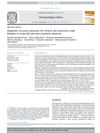Search
forLearn
1 / 1 resultsResearch
5 / 1000+ results
research Teledermatology Consultation Using a Smartphone Multimedia Messaging Service for Common Skin Diseases in the Korean Army: A Clinical Evaluation of Its Diagnostic Accuracy
Smartphone-based teledermatology is effective for diagnosing skin diseases in the military with good accuracy.

research Diagnostic Accuracy of Trichoscopy in Trichotillomania: A Systematic Review
Trichoscopy is a reliable method for diagnosing hair-pulling disorder.

research Diagnostic Accuracy Measures for Vertical and Transverse Scalp Biopsies in Cicatricial and Non-Cicatricial Alopecias
Transverse scalp biopsies are more accurate for diagnosing non-cicatricial alopecia, but examining both types is best for accuracy.
research P077 Updates on Trichoscopy in Diagnosing Scalp Disorders: A Systematic Review of Diagnostic Accuracy, Sensitivity and Specificity
Trichoscopy is highly effective for diagnosing scalp disorders and should be used more in dermatology.

research Scalp Biopsy Influences Diagnostic Accuracy and Treatment in Black Women With Alopecia: A Retrospective Study
Scalp biopsies greatly improved diagnosis and treatment for Black women with unclear alopecia.
Community Join
5 / 333 resultscommunity Dutasteride thins eyebrows and facial hair but doesn't stop scalp loss.
Dutasteride may not effectively stop scalp hair loss and can cause thinning of facial and body hair, including eyebrows. Users suggest considering other causes like autoimmune conditions or vitamin deficiencies and exploring treatments like finasteride or minoxidil.
community AGA evaluation and first steps - BEGINNER MEGAPOST
The conversation discusses androgenic alopecia (AGA) and its treatments, focusing on finasteride, minoxidil, and ketoconazole shampoo. Finasteride is recommended as essential for preventing further hair loss.
community 13 Years Finasteride, Switched to Dutasteride - 25% increase in Total Testosterone (expected) but 150% increase in Free Testosterone?
After switching from finasteride to dutasteride, the user experienced a 25% increase in total testosterone and a 150% increase in free testosterone, with side effects like brain fog and nipple tingling. The user plans to consult a lab for accuracy and adjust the dutasteride dosage to manage side effects.
community Why Hair Loss Needs Proper Diagnosis (Dermatologist Insight)
Hair loss requires proper diagnosis as it can have various causes, and treatments like finasteride, minoxidil, and dutasteride are often used. Many people express frustration with dermatologists and turn to self-research and alternative sources for treatment.

community I need advice on my status quo, further actions and diagnostic
The user is experiencing hair loss, possibly due to androgenic alopecia or telogen effluvium, and is considering treatments like Minoxidil, Finasteride, or RU58841. They also mention potential iron deficiency and sleep deprivation as contributing factors.